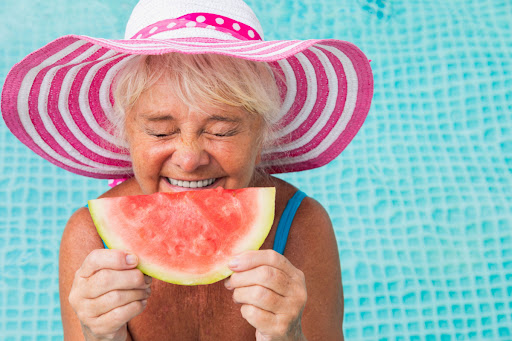Summer is the perfect time to get outside and enjoy the warm weather with loved ones. However, it’s essential to be aware of the risks of prolonged sun exposure. Older adults, especially those with chronic or underlying medical concerns, are more sensitive to high temperatures.
The good news is that there are many easy steps to take this summer to stay safe while having fun! Follow these summer safety tips for seniors that protect your health but don’t ruin all the fun:
Avoid direct sunlight as much as possible.
According to the Environmental Protection Agency (EPA), the sun’s ultraviolet rays are at their most harmful between 10 am and 4 pm. So, the best time to enjoy outdoor activities is early in the morning or in the evening.
If the afternoon hours are your prime time, consider partaking in your other favorite activities while you wait for the heat to subside. For example, you can soak in the AC while you peruse the latest offerings at the shopping mall or reconnect with friends over a game of Rummy at your independent living center in Philadelphia. Then, once the clock strikes four, you can head outside, putting our other summertime safety tips for seniors to good use.
Be aware of your prescription medication side effects.
You may have a handful of medications you need to take every day, and it can be hard to remember every little detail about each one. That’s why one of the most important summer safety tips for seniors is to review any medications at the beginning of the season. If any of your prescriptions cause increased sensitivity to the sun, talk with your doctor about any concerns you may have and ways you can stay healthy while enjoying the outdoors.
Stay hydrated!
Drink about eight cups of water and other clear or light-colored liquids every day to make sure there is enough water in your body. Steer away from drinks containing caffeine and alcohol, which cause water loss through urination. If it’s extremely hot outside or you’re participating in physical activity, increase your water intake and consider sipping on a sports drink to keep your body well hydrated.
Wear light-colored and loose-fitting clothing.
Dark clothing attracts sunlight, while light clothing prevents overheating because the colors reflect the sun. It’s also just as important to think about your clothing material as the color. Cotton or other clothing with natural fibers is a great option since it breathes easily.
Do not partake in strenuous outdoor activities.
There’s nothing like breathing fresh air while you strengthen your muscles and improve your cardiovascular health. However, participating in strenuous physical activities outdoors during the summer could be more detrimental than beneficial to your overall health. In fact, working out outside during the summer could increase your risk of heat stroke, heat exhaustion, and dehydration. For this reason, one of the top summer safety tips for seniors is to avoid strenuous outdoor activities, whether that’s a hike through the woods with your family or a yoga class on the beach. You can easily resume these activities once the temperature cools down.
Wear sunscreen!
As you age, your skin thins out and becomes more sensitive to ultraviolet rays, including UVA and UVB rays. To stay safe in direct sunlight this summer, wear sunscreen with SPF 30 or higher for an added layer of protection against sunburns. And don’t forget to cover these delicate spots: ears, upper lip, backs of your hands, and the tops of your feet.
While protecting your skin from ultraviolet rays, don’t forget about your eyes. UV rays can be just as damaging to your vision as they are to your skin. When you’re outside this summer, make sure you wear a hat and sunglasses.
Cool down with a cold bath or shower.
If you decide to participate in an outdoor activity this summer, take the preventative measures suggested above and then take a cold bath or shower at the end of the activity. This will decrease your internal body temperature and give you a refreshing start to your evening.
Risks of Prolonged Heat Exposure
Following these summer safety tips for seniors will greatly lower the risk of heat stroke, heat exhaustion, heat syncope, and dehydration. Heat exhaustion occurs when the body cannot regulate its own temperature anymore and cannot cool itself down. If heat exhaustion is not cared for properly, it can lead to a heat stroke. Heat syncope is a sudden spell of dizziness caused by hot weather. Taking medications with beta blockers increases the risk of heat syncope.
As you participate in summer activities this season, watch out for the common warning signs of heat exhaustion and heat stroke:
- Fainting
- Dizziness
- Headache
- Nausea or vomiting
- High body temperature (104 degrees or higher)
- Rapid pulse
- Heavy breathing
These conditions are serious but can be avoided by taking the proper steps, such as following the safety tips for seniors listed above and acting immediately if you notice signs of these conditions. If you feel any of these symptoms coming on, here is what can be done to prevent them from getting any worse:
- Sit down in a cool place, preferably with air conditioning.
- Drink plenty of water or light-colored fluids.
- Elevate your legs to get blood circulating back to the rest of the body and prevent swelling.
Fun and Healthy Summer Activities at Wesley Enhanced Living
At Wesley Enhanced Living, our team of highly trained professionals is committed to the safety and well-being of seniors, especially during these hot summer months. That’s why we’ve outlined these all-important summer safety tips for seniors and offer plenty of fun activities that help you stay cool.
Discover why our personal care, rehabilitation, and skilled nursing facility in Philadelphia is perfect for you! Contact us about our independent living and nursing options today!

